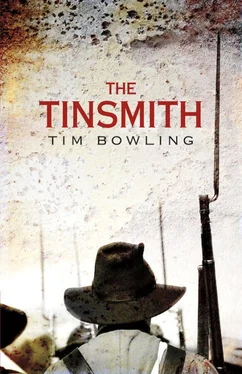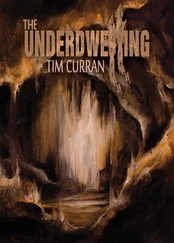Other than that rare encounter, Anson met no one, not even when he walked back and forth along the short dike—only a hundred feet long—that fronted Henry Lansdowne’s property. Sometimes he walked a half-mile along the slough bank, to a point opposite Thomas Lansdowne’s house, drawn there by the cry of crows building nests high in one of the great bell tower fir trees. Often, too, he watched the Chinese and Indians at work, and he always sought to keep out of the way of the industrious Lansdownes. But most of all, he tried not to place the silence at Crescent Slough alongside the image of Dare’s terrified face at Antietam and the mutilated corpse of his murdered master. But the thick clouds of black flies and mosquitoes hanging over every foot of the settlement, as well as the palpable sense of anticipation in the air about the salmon’s return, which was almost akin to the tension preceding a military engagement, only increased Anson’s unease.
Finally, one morning, he stood trembling on the wharf in heavy rain, watching the progress of the paddlewheeler coming up the river from the Gulf. Large drops fell off his hat brim, blurring his view. But there was little enough to see. The wind had raised a chop on the black river, and the steamer’s smoke plume immediately dissolved above the boat, which crept relentlessly up the channel, black as a bull pulling a plough. The dull thump of the paddles rose and died with the gusting wind. Anson willed it to arrive faster, eager to know if Dare was on board.
The black shape broadened gradually in the channel as the tide-weighted paddles thumped out the heavy minutes. It was a dismal process, and so the sudden apparition of Louisa running up the gangway lifted Anson’s spirits.
She was, indeed, a regular whip of a child, crackling with energy, her dark hair and eyes vivid and shining like black fire. In the days since meeting her on the peat bog, Anson had grown very attached to the idea of her presence, perhaps too attached. For he had begun to pity her, and he was in no position to feel that way; he had no right, and no manner of helping even if he overlooked the insignificance of their bond. To be so filled with joy in such a joyless place! But perhaps the child’s lot was simply the human one, and the reason he felt so removed from God.
“Dr. Baird! Dr. Baird! We’re going to have a house guest! He’s coming on the steamer!” The child’s hair gusted around her bright cheeks, her words danced on the air.
Anson smiled. “A guest? What sort of guest? Another doctor?”
With a flutter of her hands, she pushed her hair back and leaned forward, blinking downriver into the rain. “I don’t think so. Father didn’t say.” She chewed on her full bottom lip. “But…” Her eyes widened. “He’s an American, like you.”
No, child, Anson thought, not like me, a worn-out country doctor who suffers terrible nightmares when he can fall asleep at all, a veteran who served his country and his conception of God and now hardly believes in either. That kind of American doesn’t generally travel the world. He stays home, among his people, quietly doing his work and waiting, like those under the grass at Antietam and Gettysburg, to be forgotten.
The paddlewheeler drew close enough for the dark water on the paddles to be visible. Smoke lay like a whipped cur along the stack. The rain bounced off the river and the planks of the wharf.
“Where’s your bonnet?” Anson said. “You should be wearing one, Louisa.”
She laughed and tilted her face up into the storm. “I hope he isn’t a doctor. They worry too much.”
She stood on her tiptoes at the very edge of the wharf. Anson was certain she was about to clap. But then her uncle emerged out of the weather, moving blackly and efficiently toward the moored skiff, and the sight of him automatically drew her back from the edge.
Slowly the paddles stopped their revolutions. Into the new quiet the rain swelled. Anson realized he had no desire to meet one of his countrymen. Such encounters were inevitably delicate, especially if the person was from the South. But, of course, he didn’t meet many Southerners, and, in any case, he preferred not to discuss the war or current politics with Northerners either. Over the years, he had listened to patients who had served in the army, listened with sympathy to the catalogues of ailments that they’d picked up in the great conflict, and even held his tongue when some veterans complained that freeing the niggers hardly seemed an honourable accomplishment. Anson had heard such comments often enough and tried not to judge the speakers; usually they were suffering from old wounds and sicknesses, and then there was always the inexplicable sense of loss that followed a war. The ancient Greeks and Romans had experienced it too, and their battles had never been so momentous and violent in scale.
Well, whoever this American was, Anson recognized that he wasn’t likely to be much involved with him. In fact, if Dare was on the steamer, Anson wouldn’t even be staying on at Chilukthan.
To his surprise, this thought induced a wave of melancholy. He looked at the child again. How different his life would have been if he’d become a father! That responsibility would be enough to steady a man, to keep him working for the future despite whatever nightmares and plagues trailed after him from the past. Thomas Lansdowne, for example: he possessed an admirable resolve to succeed, a faith that Anson could hardly understand, though he deemed it the proper attitude for the head of a family. This child, then, was fortunate. He need not pity her.
They stood in silence as the driving rain weakened to a drizzle and Henry Lansdowne rowed evenly into the choppy channel to the steamer. Once there, he helped the passengers into the skiff and began rowing back again. Anson suddenly felt an overwhelming desire to flee. There was but a single passenger, a stranger. Dare had not returned.
As the skiff pulled closer, Anson’s nerves began to fray. The passenger’s appearance was disturbing. He was not young, so he would have knowledge and opinions of the war. But much worse than this was the one sleeve of the man’s coat: it was empty and pinned to his chest. A wounded veteran, and all that remained to complete the dismal picture was the man’s country. For Anson could not, even in his most patriotic moments, believe that the defeated Confederacy had gone away, at least not as a moral entity in the minds of its citizens.
He watched Henry Lansdowne moor the skiff and help the passenger out. Louisa ran forward but then turned to him, beaming. “Come along, Dr. Baird, come and meet our guest.”
And for the child’s sake, certainly not his own, Anson stood in the drizzle and awkwardly shook the passenger’s gracefully extended left hand.
“Ambrose Richardson. A pleasure to meet you, sir.”
The accent wasn’t strong, but it was there, a mild lilt, a subtle music. By the time Anson had come close enough to the man to see his narrow face and pale blue eyes, receding hairline, and full handlebar moustache of pure white, he had expected the worst. Now the man, tall and compactly built, his long legs bowed, suggesting he’d spent considerable time on horseback, was scanning Anson’s face, likely trying to estimate his allegiances and service record. It was wearying.
Falling back on his habitual courtesy, Anson asked the newcomer how long he planned to stay in Chilukthan.
“It depends,” Ambrose Richardson said, removing his hat from where he’d expertly tucked it under what remained of his amputated limb. He shook the rain from the hat before settling it back on his head. “If I like what I see of this salmon venture, I might want to stay a while and watch the proceedings. I understand the fishing is quite the spectacle.”
Читать дальше












